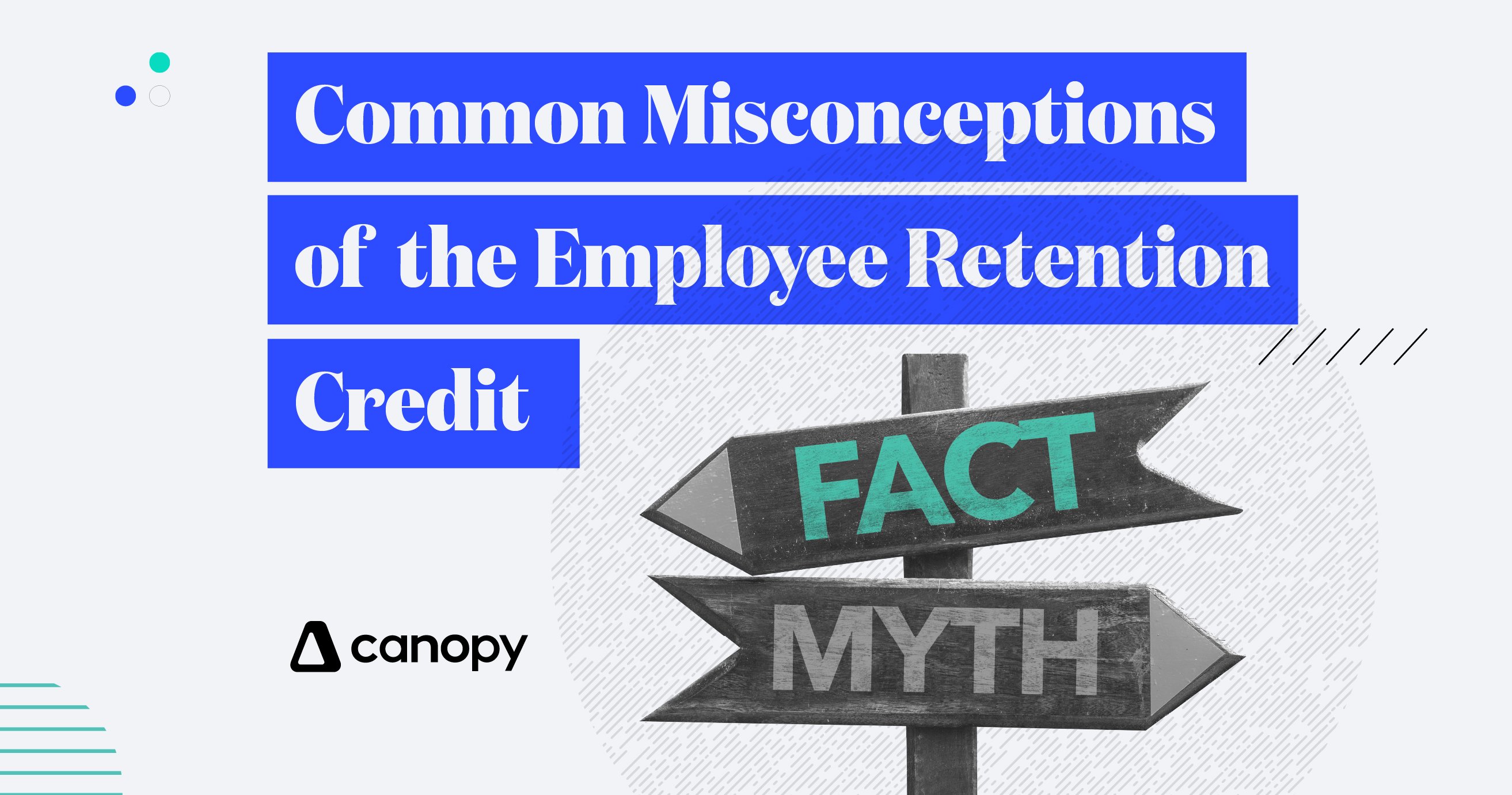The Employee Retention Credit (ERC) is a valuable resource that can help businesses navigate the complex world of employee retention, but understanding its complexities and maximizing its benefits can be a daunting task. That's where Tri-Merit comes in. With their expertise in tax incentives and credits, Tri-Merit is well-positioned to guide businesses through the complexities of ERC. In this article, they delve into the misconceptions of the ERC. Canopy is partnering with Tri-Merit to help accountants better understand and assist their clients with ERC.
There are a number of misconceptions surrounding the Employee Retention Credit (ERC). These misguided thoughts are made worse by a number of issues, including:
- Updates to legislation
- A number of updated guidance from the IRS
- Confusing and conflicting information
- And a large backlog of returns to work through at the IRS
This article aims to highlight the most common ERC misconceptions and provide references to the most up-to-date information available.
Five Common Misconceptions We’re Seeing
Number One: The deadline to claim the ERC is soon.
No, there is no pressing deadline to file for ERC, even from the earliest availability in 2020. In other words, it’s not too late. The first official deadline is July of 2023, and that has a slight potential to change if there is more legislation passed (although that’s not likely to happen).
Number Two: You’re required to show both a reduction in sales and the impact of government mandates
This too is incorrect. It is accurate to say there are two ways to qualify:
- Show a 20% reduction in sales from the same quarter in 2019.
- Show that your business was directly impacted by government mandates during the qualifying period.
It is an “either/or,” not “and” scenario.
Number Three: Any government mandate counts toward the Employee Retention Credit
Virtually every state and local government had some sort of mandate during the pandemic, but only those orders which directly and unequivocally impacted business sales apply to the ERC.
Here are a few examples:
- If your business was able to switch to remote work and perform all work dealing with your business, it may not mean you’re impacted to receive the ERC. Simply going remote does not impact business operations.
- Mask mandates aren’t really something that’s directly tied to a loss in sales, for most businesses.
On the other hand, if you had a retail location where your local government wasn’t given essential status, this would likely qualify due to the fact the shop couldn’t physically open, directly affecting sales.
Remember, it’s government orders directly impacting sales.
Note: National mandates don’t necessarily apply either. The federal government never ordered a shut down of specific businesses and the CDC issued guidance enacted by state and local governments, if accepted.
Number Four: The business was impacted, but due to other factors
If your business saw a drop in compared sales, but the direct reason wasn’t directly tied to the pandemic, it’s not necessarily applicable to the ERC.
Perhaps the best example of this is the current supply chain issues. Nearly every business and individual is impacted by this issue—but it doesn’t auto qualify you for the ERC. The supply impact must be directly related to a Covid restriction.
If a supplier shuts down due to not receiving material to make your product, that’s not applicable to the ERC. Another example is the recent Texas freeze. If a business relied on a Texas company that was affected by the freeze and couldn’t fulfill an order, the business would be impacted, but not in a way that allows it to claim the ERC.
However, if your supplier shuts down due to a Covid outbreak and you’re unable to find a different supplier and this creates a 20%+ reduction in sales, you’ll likely qualify for the credit.
Number Five: Businesses that started in late 2019 don’t qualify for the ERC
Rounding out our list of employee retention credit misconceptions is this one. Businesses that began later in 2019 are still able to apply for the ERC. The tabulation is different since you can’t compare Q1 of 2020 to Q1 of 2019, but there is guidance on how to do so.
All ERC-Related Updates
Since the CARES act passed, there have been new bills and IRS notices issued that affect how businesses apply for and receive the Employee Retention Credit. Below is a compiled list of these bills and notices.
- Coronavirus Aid, Relief, and Economic Security (CARES)
- Consolidated Appropriations Act (CAA)
- American Rescue Plan Act of 2021 (ARP)
- FAQs ERC Under The CARES Act (FAQs)
- IRS Notice 2021-20 (21-20)
- IRS Notice 2021-23 (21-23)
- IRS Notice 2021-49 (21-49)
- Revenue Procedure 2021-33 (21-33)
- Infrastructure Investment and Jobs Act O IRS Notice 2021-65
Nuance and Murky Guidance are Prevalent
As we’ve covered, there is some poor advice circulating around the Employee Retention Credit. Unfortunately, it’s likely some who may not qualify will apply and perhaps be hit with issues once the IRS catches up and reviews everything.
On the other hand, there are many businesses that likely do qualify, but are scared away due to many of the covered misconceptions. Wonder if you qualify for the ERC? Schedule a discovery call with a professional from Tri-Merit. Their experts are fully up to date with all guidance and will help you figure out the best strategy for your situation.








Get Our Latest Updates and News by Subscribing.
Join our email list for offers, and industry leading articles and content.